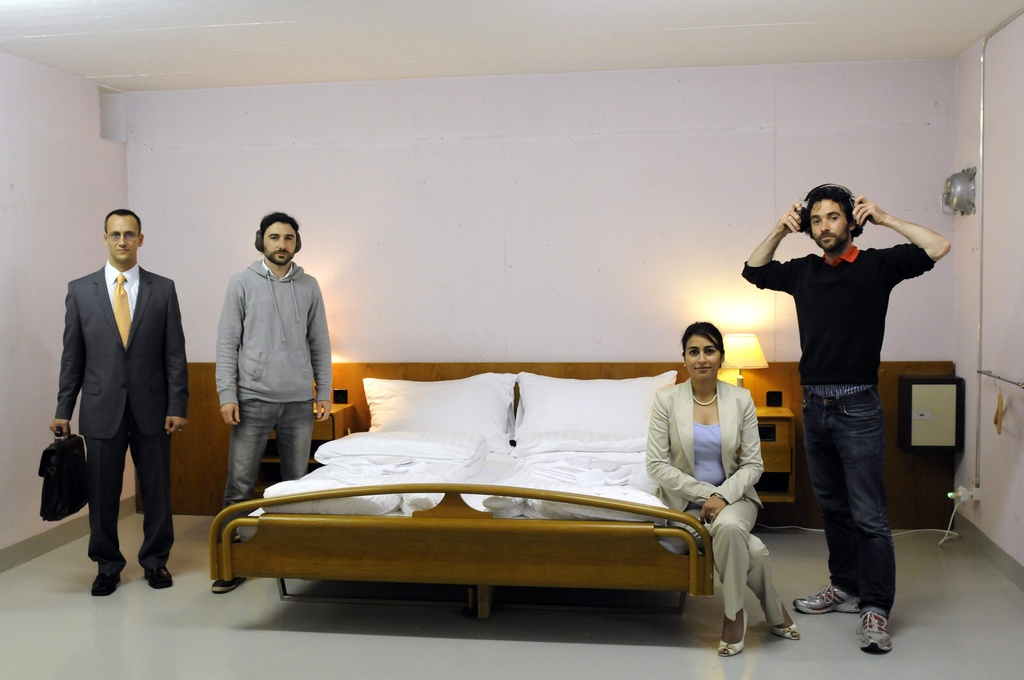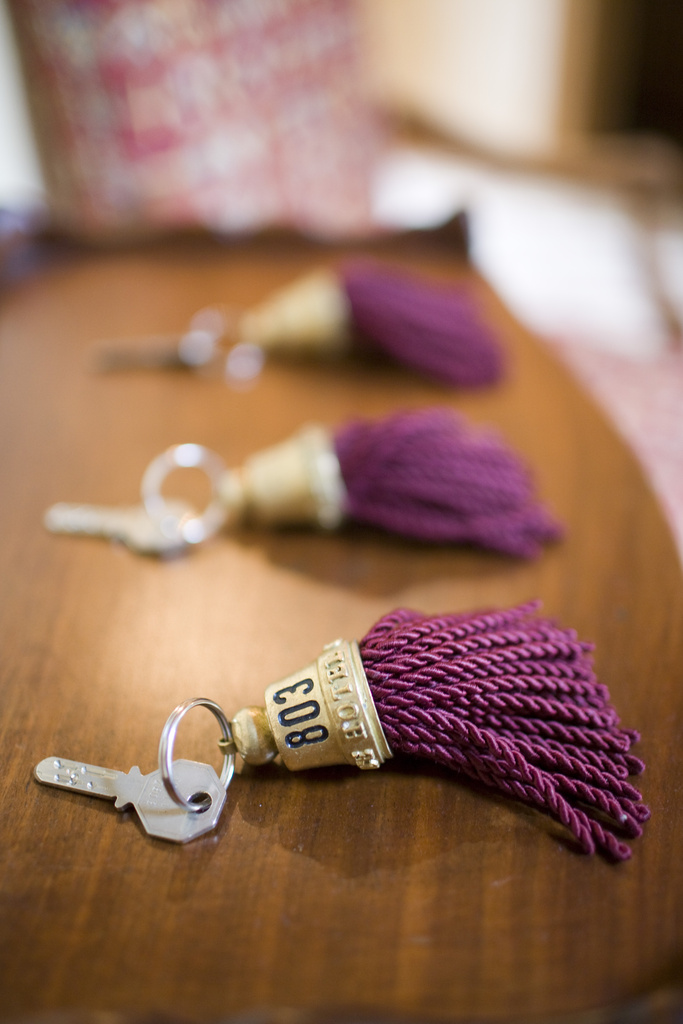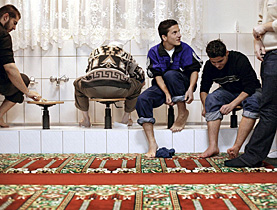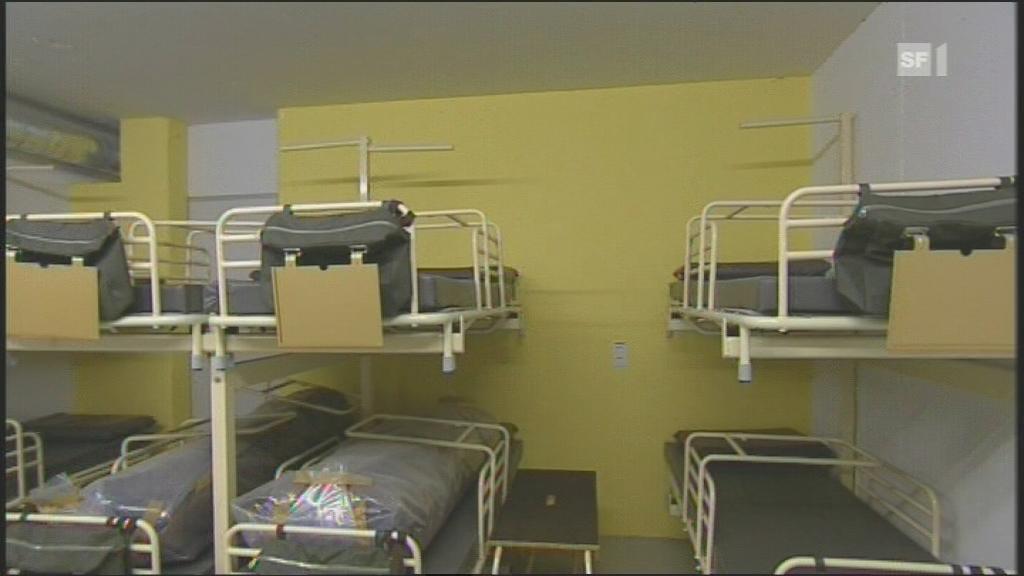“Zero star” hotel targets commercial expansion

Switzerland may be the land of luxury, but one unique no-frills hotel concept plans to occupy the niche budget sector with eye-catching venues and a butler service.
The Zero Star Hotel started off life in a disused nuclear bunker as an art project making a statement against making a fast buck. But it enjoyed such success that it will soon relaunch as a commercial venture.
The original location in Teufen, canton Appenzell Outer Rhodes, closed down a year after opening but has transformed into a museum commemorating the original hotel. The new site is shrouded in secrecy but promises to be unusual and in a city.
The idea was born when twin brothers Frank and Patrik Riklin, both artists, were asked by the local council to convert the nuclear bunker into affordable accommodation. They claim they created the world’s first zero-star hotel under the caption: “The only star is you”.
But the 14-bed low-budget hotel, charging SFr10-30 ($8.75-$26) a night, proved such a big hit that the twins and their partner, hospitality expert Daniel Charbonnier, co-founded the concept as a commercial brand.
“We had to walk before we could run, so the first hotel acted as a prototype,” Charbonnier told swissinfo.ch. “Our market research showed that 80 per cent of guests would come back, but they told us they would prefer it to be in a city.”
Butler service
Charbonnier, who runs hospitality consultancy Minds in Motion, would not reveal how many guests had stayed at the hotel, but said they came from 29 countries, from all walks of life and had an age range of seven to 77.
“Many of our guests told us they would normally stay in a three- or four-star hotel,” he said. “We managed to attract customers who wanted a good quality of service but who had recently tightened their budgets.”
The austere windowless surrounding and shared bathrooms were brightened by a butler who brought tea or coffee in the morning and acted as a concierge for guests. Aside from the unique location, the unique selling point will remain the personalised butler service for guests travelling on a shoestring.
A butler may seem at first glance to be at odds with an artistic statement against greed, but Charbonnier insisted that the concept works.
“A butler has many negative connotations with luxury, but a person who spends less on their accommodation also deserves first-class service,” he said. “Our message is that making money involves hard work and that there are no sustainable short cuts.”
Expensive image
The management group even turned down an offer of financial backing from a Russian investor because they felt he did not understand the concept and that the brand’s integrity would be lost.
Urs Eberhard, a vice-director at the Swiss tourist board, was enthusiastic about the hotel turning commercial.
“Anything that differentiates itself and provides a unique experience has a chance of success,” he told swissinfo.ch. “Maybe this will change people’s perception that Switzerland is an expensive place to visit.”
“There is a current trend for people to downgrade hotels or even to go camping. People are now much more willing to experience different offerings, staying in a youth hostel while hiking and then spoiling themselves in a wellness centre by a lake.”
Much of the success of the Zero Star Hotel has been put down to wide media coverage providing free publicity. The hotel has not spent a single franc on advertising.
But Christian Laesser, a professor of tourism and service management at St Gallen University, has doubts about what would happen when the media coverage runs dry.
Location, location, location
“It would then have to seek unconventional means of getting noticed on the market or rely on word of mouth so it can continue to generate revenues,” he told swissinfo.ch.
In fact, Zero Star Hotel has already taken great strides to getting noticed, having been listed in the Lonely Planet travel guide for a year.
Lukas Brunner from the research institute for leisure and tourism at Bern University believes the hotel is making the right move to an urban centre because cities, particularly Zurich and Geneva, are the current prime locations for attracting guests.
But he cautioned that the hotel would need to find a location as unique as the Appenzell nuclear bunker to keep its appeal.
“This will not be easy in a city such as Zurich because real estate prices are much higher,” he told swissinfo.ch. “The location is very important, but I believe the concept could be profitable.”
Charbonnier said several sites were being investigated but could not give a time scale on when the new hotel would open. But he was optimistic that the brand could expand further to include other locations, even beyond Switzerland.
Matthew Allen, swissinfo.ch
The Federal Statistics Office has also been keeping accommodation statistics for 75 years. Here are some of the main changes between 1934 to 2009:
The number of hotels fell by 29 per cent from 7,756 to 5,533. But the number of beds available rose by 35%.
The number of overnight stays rose 2.5 times from around 14.3 million in 1934 to 35.6 million in 2009.
However, people are staying in hotels for less time: an average 2.3 nights (2009) compared with 4.2 nights (1934).
The origin of guests has flipped around: in 1934, 57% were Swiss and 43% foreigners, and in 2009 43% were Swiss, 57% were foreigners.
The number of overnight stays in Swiss hotels fell last year by almost five per cent – the first decrease in three years – as the financial downturn began to bite.
There were 35.6 million overnight stays in Switzerland in 2009, according to the Federal Statistics Office. This is 4.7 per cent less than in the record in 2008.
On the whole, cities did better than alpine areas, with mountainous Graubünden recording the biggest drop, down 5.7 per cent.
The British recorded the biggest decrease – down 19 per cent. Tourists from big market Germany also fell.
The largest rise was seen among Chinese tourists – up 27 per cent – although they still make up a small part of overnight stays.

In compliance with the JTI standards
More: SWI swissinfo.ch certified by the Journalism Trust Initiative




You can find an overview of ongoing debates with our journalists here. Please join us!
If you want to start a conversation about a topic raised in this article or want to report factual errors, email us at english@swissinfo.ch.